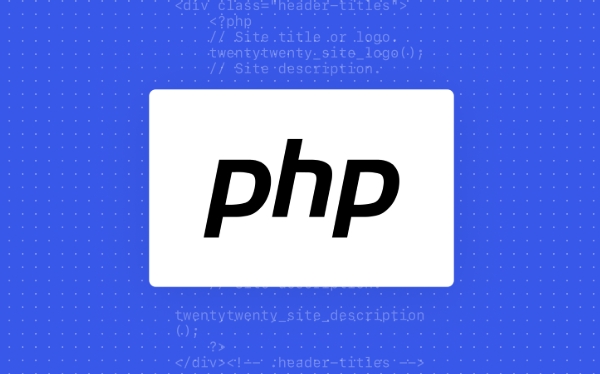Calling PHP functions in HTML pages requires saving the file in .php format and running in the server environment. The specific steps are as follows: 1. Change the file suffix to .php to ensure that the server can parse the PHP code; 2. Embed PHP function calls in the .php file to dynamically generate content; 3. You can output HTML elements, such as buttons or menus through functions, to achieve dynamic page control; 4. Pay attention to ensuring that the server supports PHP, correctly wraps PHP code, and avoid running PHP directly in pure HTML files.

It is not possible to call PHP functions directly in HTML pages, because HTML is a static language, while PHP is a server-side language. However, you can implement the effect of calling PHP functions by embedding PHP code in HTML files, provided that the file is processed by the server as a PHP file.

1. Make sure the file is in .php format
If your file suffix is .html , the server will not parse the PHP code inside by default. To make PHP code run, you must first save the file in .php format.
For example, change the original index.html index.php so that the server will process the PHP part.

2. Embed PHP function calls in HTML
In the .php file, you can switch HTML and PHP modes at any time. For example, if you want to display a content generated by a PHP function on the page, you can write it like this:
<!DOCTYPE html>
<html>
<head>
<title>PHP in HTML example</title>
</head>
<body>
<h1>Welcome to our website</h1>
<?php
function getGreeting() {
return "The weather is good today";
}
echo "<p>" . getGreeting() . "</p>";
?>
</body>
</html> This way, when the page loads, it will show that今天天氣不錯(cuò). You can also place PHP code anywhere you want to generate content dynamically.

3. Generate HTML content using PHP functions
Sometimes you may want to use PHP functions to generate a whole piece of HTML content, such as dynamic menus, buttons, etc. At this time, you can write HTML in the function and then call it directly:
<?php
function showButton() {
echo '<button>Click me</button>';
}
showButton();
?>This allows you to dynamically insert buttons into the page. If you want to change the button style in the future, you only need to change the function content and don't need to look for code everywhere.
4. Precautions and FAQs
- Ensure that the server supports PHP : You cannot open the
.phpfile directly by double-clicking, it must be run through a local server (such as XAMPP, WAMP) or an online server. - PHP code must be wrapped with
<?php ... ?>: otherwise it will not be executed. - You cannot run PHP in pure HTML files : This is generally not recommended unless the server has made special configurations.
Basically that's it. Although it seems simple, it is easy to make mistakes due to file format or server environment problems. Remember to confirm that the file is .php first, and then test whether PHP is effective.
The above is the detailed content of How to call a php function in html?. For more information, please follow other related articles on the PHP Chinese website!

Hot AI Tools

Undress AI Tool
Undress images for free

Undresser.AI Undress
AI-powered app for creating realistic nude photos

AI Clothes Remover
Online AI tool for removing clothes from photos.

Clothoff.io
AI clothes remover

Video Face Swap
Swap faces in any video effortlessly with our completely free AI face swap tool!

Hot Article

Hot Tools

Notepad++7.3.1
Easy-to-use and free code editor

SublimeText3 Chinese version
Chinese version, very easy to use

Zend Studio 13.0.1
Powerful PHP integrated development environment

Dreamweaver CS6
Visual web development tools

SublimeText3 Mac version
God-level code editing software (SublimeText3)

Hot Topics
 php regex for password strength
Jul 03, 2025 am 10:33 AM
php regex for password strength
Jul 03, 2025 am 10:33 AM
To determine the strength of the password, it is necessary to combine regular and logical processing. The basic requirements include: 1. The length is no less than 8 digits; 2. At least containing lowercase letters, uppercase letters, and numbers; 3. Special character restrictions can be added; in terms of advanced aspects, continuous duplication of characters and incremental/decreasing sequences need to be avoided, which requires PHP function detection; at the same time, blacklists should be introduced to filter common weak passwords such as password and 123456; finally it is recommended to combine the zxcvbn library to improve the evaluation accuracy.
 PHP Variable Scope Explained
Jul 17, 2025 am 04:16 AM
PHP Variable Scope Explained
Jul 17, 2025 am 04:16 AM
Common problems and solutions for PHP variable scope include: 1. The global variable cannot be accessed within the function, and it needs to be passed in using the global keyword or parameter; 2. The static variable is declared with static, and it is only initialized once and the value is maintained between multiple calls; 3. Hyperglobal variables such as $_GET and $_POST can be used directly in any scope, but you need to pay attention to safe filtering; 4. Anonymous functions need to introduce parent scope variables through the use keyword, and when modifying external variables, you need to pass a reference. Mastering these rules can help avoid errors and improve code stability.
 How to handle File Uploads securely in PHP?
Jul 08, 2025 am 02:37 AM
How to handle File Uploads securely in PHP?
Jul 08, 2025 am 02:37 AM
To safely handle PHP file uploads, you need to verify the source and type, control the file name and path, set server restrictions, and process media files twice. 1. Verify the upload source to prevent CSRF through token and detect the real MIME type through finfo_file using whitelist control; 2. Rename the file to a random string and determine the extension to store it in a non-Web directory according to the detection type; 3. PHP configuration limits the upload size and temporary directory Nginx/Apache prohibits access to the upload directory; 4. The GD library resaves the pictures to clear potential malicious data.
 Commenting Out Code in PHP
Jul 18, 2025 am 04:57 AM
Commenting Out Code in PHP
Jul 18, 2025 am 04:57 AM
There are three common methods for PHP comment code: 1. Use // or # to block one line of code, and it is recommended to use //; 2. Use /.../ to wrap code blocks with multiple lines, which cannot be nested but can be crossed; 3. Combination skills comments such as using /if(){}/ to control logic blocks, or to improve efficiency with editor shortcut keys, you should pay attention to closing symbols and avoid nesting when using them.
 How Do Generators Work in PHP?
Jul 11, 2025 am 03:12 AM
How Do Generators Work in PHP?
Jul 11, 2025 am 03:12 AM
AgeneratorinPHPisamemory-efficientwaytoiterateoverlargedatasetsbyyieldingvaluesoneatatimeinsteadofreturningthemallatonce.1.Generatorsusetheyieldkeywordtoproducevaluesondemand,reducingmemoryusage.2.Theyareusefulforhandlingbigloops,readinglargefiles,or
 Tips for Writing PHP Comments
Jul 18, 2025 am 04:51 AM
Tips for Writing PHP Comments
Jul 18, 2025 am 04:51 AM
The key to writing PHP comments is to clarify the purpose and specifications. Comments should explain "why" rather than "what was done", avoiding redundancy or too simplicity. 1. Use a unified format, such as docblock (/*/) for class and method descriptions to improve readability and tool compatibility; 2. Emphasize the reasons behind the logic, such as why JS jumps need to be output manually; 3. Add an overview description before complex code, describe the process in steps, and help understand the overall idea; 4. Use TODO and FIXME rationally to mark to-do items and problems to facilitate subsequent tracking and collaboration. Good annotations can reduce communication costs and improve code maintenance efficiency.
 Quick PHP Installation Tutorial
Jul 18, 2025 am 04:52 AM
Quick PHP Installation Tutorial
Jul 18, 2025 am 04:52 AM
ToinstallPHPquickly,useXAMPPonWindowsorHomebrewonmacOS.1.OnWindows,downloadandinstallXAMPP,selectcomponents,startApache,andplacefilesinhtdocs.2.Alternatively,manuallyinstallPHPfromphp.netandsetupaserverlikeApache.3.OnmacOS,installHomebrew,thenrun'bre
 Learning PHP: A Beginner's Guide
Jul 18, 2025 am 04:54 AM
Learning PHP: A Beginner's Guide
Jul 18, 2025 am 04:54 AM
TolearnPHPeffectively,startbysettingupalocalserverenvironmentusingtoolslikeXAMPPandacodeeditorlikeVSCode.1)InstallXAMPPforApache,MySQL,andPHP.2)Useacodeeditorforsyntaxsupport.3)TestyoursetupwithasimplePHPfile.Next,learnPHPbasicsincludingvariables,ech






